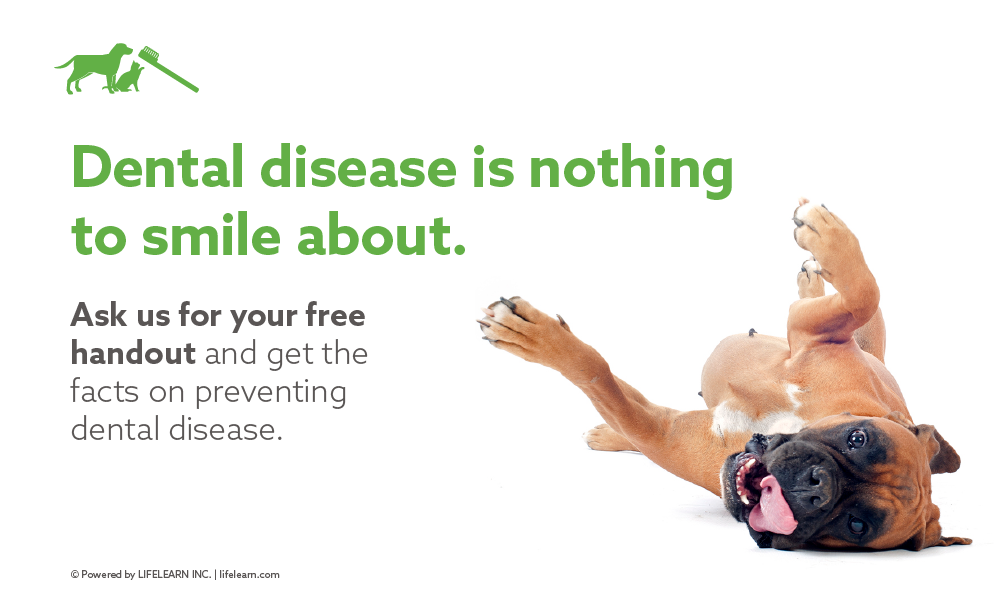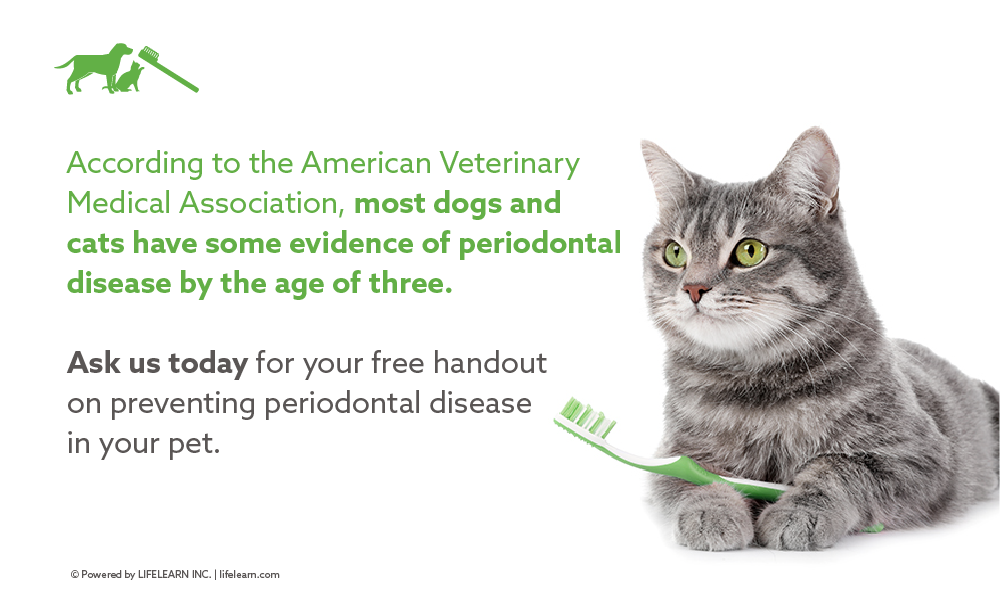|
Dental disease in pets is not uncommon. According to the American Veterinary Medical Association, most dogs and cats have some evidence of periodontal disease by the age of three, with symptoms such as bad breath, difficulty eating or chewing, and pawing at the mouth. Pets need dental care just as much as people do! Daily dental care is far more than a cosmetic issue. It's the most important defense against periodontal disease, often known as "gum disease." Caused by plaque and tartar buildup, which is loaded with dangerous bacteria, periodontal disease can destroy the tissues that surround the teeth, eventually causing tooth root abscesses and tooth loss. The bacteria from periodontal disease can also enter the bloodstream and cause infections in other areas of the body, leading to heart, kidney, and liver disease. To help your pet avoid the risks of periodontal disease, here are the answers to some common dental questions: Are dental problems the same for people and pets? No! For people, tooth decay (cavities) is the most common dental problem. In dogs, for example, tooth decay represents less than 10% of all dental problems. The most common dental problem for dogs and cats is periodontal disease. What causes plaque and tartar to form and how does this cause periodontal disease? Just like your mouth, your pet's mouth is home to thousands of bacteria. As these bacteria multiply on the surface of teeth, they form an invisible layer called plaque (biofilm). While some plaque is removed by your pet's tongue and chewing habits, some remains. If allowed to remain and build up over time, plaque thickens and mineralizes to become tartar. Tartar accumulates both above and below the gum line, leading to inflammation of the gums (gingivitis), further plaque and tartar accumulation, and eventually serious periodontal disease. How can I help prevent plaque and tartar buildup? Certain types of chew toys and treats may help reduce or delay plaque and tartar buildup. Some pet foods are also specifically formulated as dental diets that mechanically and/or chemically assist in plaque and tartar control. Water additives are also available. Yet daily brushing is the best defense against tartar buildup. (Note: Bones, antlers, and other hard chew toys are not recommended as they can chip or fracture teeth.) Can I use a toothpaste formulated for humans? Absolutely not! You should never use human toothpaste to clean your pet's teeth. Human toothpaste contains ingredients that can cause digestive upset if swallowed by pets. Some also contain xylitol (a sugar substitute) that, while safe for human consumption, can be lethal for dogs. Xylitol is rapidly absorbed into the bloodstream and can cause hypoglycemia (low blood sugar), liver failure, seizures, and even death in dogs. Avoid using baking soda to clean your pet's teeth. Baking soda is highly alkaline, and can upset the acid balance in your pet's digestive tract if swallowed. To safely clean your pet's teeth, use a specially formulated pet toothpaste. Pet toothpastes are non-foaming, safe to swallow, and available in pet-appealing flavors, such as poultry and beef, which help your pet to look forward to that daily brushing. Yum! Will tooth brushing remove the tartar that has already built up? No. Once the tartar has formed, your veterinarian will need to perform a professional scaling and polishing done with general anesthesia. Do I have to make an appointment prior to scheduling my pet to have a scaling and polishing? Yes. Why? Your veterinarian will need to thoroughly examine your pet's mouth and assess whether there are any underlying or related diseases. They may also need to do preanesthetic blood work prior to the procedure. Your veterinarian will advise you whether dental x-rays are needed. What happens when I bring my pet in for a dental cleaning? Your veterinarian will start the dental procedure by placing your pet under general anesthesia and perform a careful, in-depth dental examination sometimes followed by dental x-rays. X-rays are often recommended, as just like with people, there may be problems below the gum line that can only be identified with x-rays. A cleaning without x-rays is a missed opportunity to improve your pet's health and quality of life. Following the x-rays, the scaling and polishing can begin. In the case of advanced periodontal disease, where tooth roots are exposed, extractions may be needed. Since it's impossible for your veterinarian to predict the extent of dental disease before doing a thorough oral examination of your pet while under anesthesia, your veterinarian may contact you during the dental procedure to discuss the care that is needed or any new findings along the way. Article courtesy of LifeLearn
4 Comments
3/25/2021 09:21:40 am
Hello
Reply
Thanks for pointing out that a veterinarian would be able to find any underlying diseases in your pet by examining their mouth. In that case, pet dental care would be as important as other aspects of their health. It's because there might be a possibility of diseases coming from the germs and bacteria staying in their mouth if not cleaned.
Reply
10/15/2022 03:20:15 am
It's interesting when you said that anesthesia would be provided for a deep inspection for your pet. My cousin thinks his pet has a dental issue because she is not eating properly. He asked if I had any opinions on what would be the best option to prevent tribulations. I appreciate your explanation about the importance of consultation. I'll tell him he can consult a trusted veterinarian as they can provide information about the process.
Reply
4/5/2023 02:00:27 am
Thanks for helping me understand that the plaque becomes tartar once it mineralizes and thickens. I wonder if that is the case with the rescue puppy my neighbor found earlier. And it seems like it might even need a pet oral surgery because of the damage it has on its upper teeth.
Reply
Your comment will be posted after it is approved.
Leave a Reply. |
Archives
June 2023
Categories
All
|
Get in touch4268 Three Mile NW
Grand Rapids, MI 49534 Phone: (616)791-2011 Fax: (616)791-1802 E-Mail: general@schmittsah.com office hoursMonday, Wednesday, Friday: 8:30 am to 6:00 pm
Tuesday, Thursday: 8:30 am to 6:00 pm Saturday: 8:30 am to 12:00 pm Sunday: Closed After hour emergency consultations are available to clients of record until 10:00 pm. Our main line will direct to the doctor on call. |


 RSS Feed
RSS Feed


